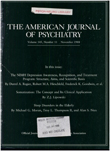Supersensitivity to light: possible trait marker for manic-depressive illness
Abstract
Exposure to light during the night reduces plasma melatonin levels. A previous study showed that, in response to light, nighttime plasma melatonin levels fell twice as much in a group of acutely ill manic- depressive patients as in a group of normal subjects. The present study compares 11 euthymic manic-depressive patients not taking medications with 24 age- and sex-matched normal subjects. Melatonin levels in these patients also fell twice as much as the levels of the normal subjects, suggesting that supersensitivity to light may be a trait marker for bipolar affective disorder.
Access content
To read the fulltext, please use one of the options below to sign in or purchase access.- Personal login
- Institutional Login
- Sign in via OpenAthens
- Register for access
-
Please login/register if you wish to pair your device and check access availability.
Not a subscriber?
PsychiatryOnline subscription options offer access to the DSM-5 library, books, journals, CME, and patient resources. This all-in-one virtual library provides psychiatrists and mental health professionals with key resources for diagnosis, treatment, research, and professional development.
Need more help? PsychiatryOnline Customer Service may be reached by emailing [email protected] or by calling 800-368-5777 (in the U.S.) or 703-907-7322 (outside the U.S.).



